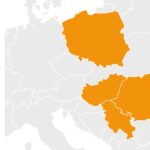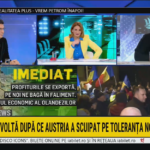Interview Dimitar Bechev (North Carolina)
Interview with Dimitar Bechev, research fellow at the Center for Slavic, Eurasian, and East European Studies at the University of North Carolina at Chapel Hill and non- resident Senior Fellow at the Atlantic Council. In 2017, he published “Rival Power. Russia’s Influence in South- East Europe” at Yale University Press.
What are the structural conditions in south-eastern Europe that make the environment susceptible to Russian influence? What can Russia weaponise in this space?
The structural conditions have less to do with the structure of military power in the region and more to do with the domestic situation. Domestic conditions probably predominate. The weakness of the institutions and the deficit in the rule of law create a lot of openings for Russian influence, as many people are willing to cooperate with Russia for private gain. There are plenty of examples to that effect, especially in the field of energy, where Russia has a lot to offer. To make a long story short, it is the embedded corruption and the lack of rule of law that creates so many openings for Russia in its mission to disrupt Western influence across the region, but also particularly in Bulgaria. From this perspective, the first line of defence is investing in the rule of law framework, in transparency, checks and balances. At the end of the day, good governance matters for defence policy too. If the rule of law is guaranteed, there would more transparency and a greater degree of agreement on what the priorities are and on how to allocate limited resources, so the defence outcomes in Bulgaria would be better than what we have right now. This is partly because of the embedded corruption and a military that has been linked to the Russian military-industrial complex, especially when it comes to more high-end weaponry. This creates a vicious circle: Russia is influential because Bulgaria is corrupt, and Bulgaria is corrupt because Russia is used to projecting its influence across sectors in the country.
A special character in your book is Konstantin Malofeev. He is like a Balkan ghost; he is everywhere. What role do such oligarchs and proxies play in the Kremlin’s broader grand strategy for the region?
Dimitar Bechev research fellow at the Center for Slavic, Eurasian, and East European Studies at the University of North Carolina at Chapel Hill.
He is certainly an entrepreneurial force. He is a supporter of conservatism, not necessarily the Kremlin’s man, but he does work occasionally for the Kremlin. That was the case in the Donbas in the early days, where his networks were critical in spearheading the rebellion that fortified Moscow’s local position, and he had the Russian state behind him. The same thing happened in the Balkans with Malofeev and his proxies and allies in many places, certainly in former Yugoslavia, but also in Bulgaria. Sometimes those people are contracted by the Russian state to perform tasks, or in some cases they are the ones who bring their know-how to the security establishment for various projects built from the ground up. I think that was the case in Montenegro1 in all likelihood. It was a freelance operation that was later taken over by the state.
The more general point is that Russia operates this grey area where the line between public and private is blurred. It is like in Russia, where there is a very fuzzy line between the Kremlin’s official policy and where the private interests and business endeavours of the elite start. The same applies in the conduct of its foreign policy.
There is a limited cultural affinity that makes Russian inroads in this region more likely. Who are the local vectors able to project Russian soft power in this broader purpose of influencing public opinion?
Propaganda is very flexible. In a country like Romania it won’t be about Russia as a force for good because there is no purchase for the story. But there are other stories – the West being hypocritical in punishing Romania, Soros and liberalism undermining traditional society and values. There are so many openings. Russia doesn’t need to be in the picture in order to project this negative policy of disruption. In a region like Central and Eastern Europe, and also the Balkans, there are so many openings that it is like preaching to the converted. Putin doesn’t need to plant those attitudes. They are already in place.
If Serbia tomorrow becomes a mem- ber state, you could very well see Vučić as a carbon-copy of Orbán. He will be talking about modernisation, he won’t be anti-Western per se, but he will control the media, he will use the EU’s financial resources to entrench him- self in power. You don’t have to go the full Erdoğan. But he can certainly be an Orbán.
A geopolitical spoiler In the former Soviet space, Russia has a positive agenda, needs to provide certain public goods, and is prepared to spend resources in order to achieve
its strategic goals. Beyond the Soviet space, in Europe in particular, the Russian agenda is negative, based on disruption and spreading disarray. In this world of competition, the weaker and more disunited the West is, the more powerful Russia becomes, and the more leverage Russia has. If there is a rift in Europe, if there is a wedge between the US and European powers, Russia stands to benefit. This is the kind of environment where Moscow can maximise its leverage.
It is certainly easier in places where Russia is accepted and you don’t need to disguise the message. In Serbia and in the former Yugoslav space, you have Sputnik Tv on the ground. If you are a local radio station in Kragujevac, you can access content for nothing as you can broadcast Sputnik’s news bulletin several times a day. There is an apriori receptivity in these societies. The resonance is there. You can see a similar trend even in places like Turkey, which historically hasn’t been a friend of Russia; but because anti-Westernism is so much entrenched these days, anything that tarnishes the US or EU can get a great deal of attention. It is not so difficult to be a Russian propagandist. It is also about demand, not only about supply. People sometimes miss the demand side.
Almost 30 years after the fall of the Berlin Wall, there is a broad crisis of democracy in the CEE region. Is south-eastern Europe secure, especially in a time when illiberal role-models and temptations are proliferating – Orbán, Putin, Erdoğan?
I don’t think that Putinism and Erdoğanism are exportable models that have much appeal. Orbán is a different matter. It is a more dangerous paradigm. At the end of the day, Hungary is a member of NATO and the EU. But this kind of personalised regime where the oligarchs around Orbán and Fidesz are fed by EU subsidies, and where the EU becomes a huge resource provider that you can milk, is very attractive. If Serbia tomorrow becomes a member state, you could very well see Vučić as a carbon-copy of Orbán. He will be talking about modernisation, he won’t be anti-Western per se, but he will control the media, he will use the EU’s financial resources to entrench himself in power. You don’t have to go the full Erdoğan. But he can certainly be an Orbán. The conditions are not that radically different.
If the rule of law is rigged and the pressure from outside that has driven many of the re- forms in the 1990s and 2000s is weakening too, the outcome is a little cocktail where illiberal attitudes and policy en- trepreneurs are trying to scapegoat the West, but also benefiting from its resources. The end result is Orbanisation.
One thing that explains the Orbán phenomenon is the illiberal legacy that remained entrenched in the region. If we go back in history, Hungarian nationalism and anti-liberalism did not spring out of nothing in 2010. It had been around before, and it had been overshadowed. Certainly that can be seen in Serbia and in other Western Balkan countries as well. If the rule of law is rigged and the pressure from outside that has driven many of the reforms in the 1990s and 2000s is weakening too, the outcome is a little cocktail where illiberal attitudes and policy entrepreneurs are trying to scapegoat the West, but also benefiting from its resources. The end result is Orbanisation. It is
a trend across the region, one that is especially dangerous in the Western Balkans because the democratic experience is more limited and there is an active legacy of conflict. There is another dimension that is missing – this whole narrative of democratic consolidation and economic prosperity working in sync is not there. The level of policy creates more instruments for state capture. The public sector remains critical for providing employment opportunities in these economies. If you control the state, then you control people’s lives because you can distribute resources and jobs. The ruling elites are incentivised to use the state as a tool for control. This is how Russia comes into the picture. Putin knows how to operate in this type of world.
In the age of the return of great-power competition, who has more leverage in organising and harnessing a counter-balancing resistance? The EU, NATO or both?
It has to be both by definition. You cannot ignore the military dimension, so hard power is key, especially in the short term, but this is barely enough. At the end of the day you have to look at the domestic political trends, robustness of institutions, the rule of law, accountability and transparency. This is not NATO’s business. I see it holistically, but in the long term, the EU is absolutely essential.
The interview was conducted by Octavian Manea




